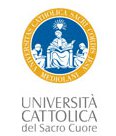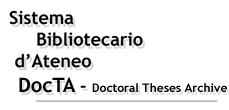|
|
DocTA - Doctoral Theses Archive >
Tesi di dottorato >
CORSO DI DOTTORATO IN SCIENZE DELLA PERSONA E DELLA FORMAZIONE AFFERENTE ALLA SCUOLA DI DOTTORATO IN SCIENZE DELLA FORMAZIONE >
Citazione:
Utilizza queste indicazioni per citare o creare un link a questo documento.
|
Lombardi, Elisabetta. "CHANGE PERSPECTIVE", Università Cattolica del Sacro Cuore, XXX ciclo, a.a. 2016/17, Milano, [http://hdl.handle.net/10280/64979].
|
| Titolo: | CHANGE PERSPECTIVE |
| Autore/i: | LOMBARDI, ELISABETTA |
| Tutor: | AJELLO, ANNA MARIA
GRECO, SARA |
| Coordinatore: | MARCHETTI, ANTONELLA |
| Lingua: | ENG |
| Abstract in italiano della tesi: | La Teoria della Mente, abilità ritenuta alla base della buona riuscita delle relazioni sociali, è un rilevante e classico oggetto di ricerca della Psicologia dello Sviluppo e dell’Educazione che negli ultimi quaranta anni ha visto proliferare numerosi studi volti a indagarne i contenuti, oltre che a identificarne e approfondirne le tappe di sviluppo e le implicazioni di tipo relazionale e sociale. L'integrazione delle prospettive, i rapporti con altre discipline e l'assunzione di approcci interdisciplinari caratterizzano gli sviluppi recenti delle ricerche in psicologia, aprendo nuove prospettive di indagine. La tesi consta di tre capitoli, ognuno dei quali si riferisce a un autonomo progetto di ricerca. Tutti gli studi hanno coinvolto bambini di età scolare: età critica per l’acquisizione e lo sviluppo delle abilità di Teoria della Mente e periodo sensibile per quanto riguarda la competenza sociale, perché la rappresentazione, la considerazione e l’assunzione della prospettiva dell’altro diventa sempre più rilevante ai fini di una funzionale vita sociale e relazionale anche al di fuori del contesto familiare.
Nello specifico, viene presentato il primo studio che propone una nuova interpretazione teorica e metodologica per valutare i risultati di un compito classico di falsa credenza di II ordine - il gelataio - in bambini di 10 anni alla luce della teoria dell'argomentazione e sottolinea il ruolo del ragionamento dei bambini nella capacità di rappresentarsi la prospettiva degli altri. Il secondo contributo, si propone di studiare il ruolo che la considerazione della prospettiva dell’altro svolge nei processi decisionali, in particolare nei giochi interattivi di scambio che valutano la fairness e l’altrusimo, analizzati in relazione alla capacità di ritardare la gratificazione.
Infine il terzo studio è una proposta applicativa perché presenta l’efficacia del Progetto TiM (Thought in Mind Project), un progetto di formazione in cui le rappresentazioni del funzionamento della mente vengono proposte alle insegnanti durante alcuni incontri di formazione in cui si svolgono attività e si co-costruisce il significato di alcune storie suggestive. Il progetto ha visto il coinvolgimento delle insegnanti di scuola primaria e ha promuove un effetto indiretto sulle capacità di mentalizzazione all’inizio e alla fine dell’anno scolastico (prima e dopo l’intervento formativo sulle insegnanti) grazie alla creazione di una “comunità mentalizzante”, in cui i contenuti mentalistici oltre ad essere condivisi, vengono trasferiti ai bambini durante le attività in classe. Tutti e tre i lavori di ricerca sono attualmente pubblicati su riviste internazionali. |
| Abstract in inglese: | People, during all their life, understand and predict the other’s behaviour from the capacity to read the other’s mental contents. This skill is one of the hallmarks of human cognition and it is fundamental to social interaction. This psychological construct is referred to the ability to attribute mental states such desires, thoughts, beliefs, intentions emotions to self and others n order to predict their and others behaviour (Premack and Woodruff, 1978; Wimmer and Perner, 1985) and it is defined Theory of Mind – ToM. Understanding of mental states allows to explain observable events as actions by inferring unobservable entities like beliefs, desires, etc... also it involves understanding that others’ mental states may differ from one’s own, and may differ from reality (e.g., false belief). Children’s Theory of Mind has been a lively area of research in developmental psychology for the last 40 years. All the studies presented in the thesis involves primary school children: during this period of age children become more flexible and appropriate in understanding of mental states and they still beginning to understand the increasingly sophisticated capacity of represent the one’s own and other’s mental states. Moreover, it is considered as a critical age because children are called to engage a new relationship (i.e. think about the social networks in school, in church, in sport activity etc...) outside the family, that means they must use their ToM ability in new relational contexts (e.g. ToM helps people plan and manage their own and others’ choices and the decisions that characterize interpersonal relationships and social competence (Takagishi, Koizumi, Fujii, Schug, Kameshima, Yamagishi, 2014; Castelli, Massaro, Sanfey, Marchetti, 2013). One of the component of ToM is the assumption of other’s perspective, in fact the child might understand that people can have different beliefs, even different beliefs about the exact same situation; something can be true, but someone might not know that; something can be true, but someone might falsely believe something different. The aim of this thesis is to explore the children representation of other’s perspective in three different ways. To achieve this purpose, the studies presented address three main questions and the three different research contexts about this ability. The first proposes a novel theoretical and methodological interpretation to evaluate the results of false belief tasks in the light of argumentation theory and asks what the role of children’s reasoning in the ability to represent others perspective. The second question considers the other’s perspective with respect to one's own ability to thinking prospectively and to assume the other’s perspective in decision making processes. In the third study the assumption of other’s perspective has shown in a mentalizing theacher’s training and its indirect effects on pupils’ ToM ability.
The first study is focused on exploring the main arguments behind 10 years old children’s responses in a classic second-order false belief task, in order to understand children's competences in the use of second level recursive thought. Interpreting the experimental setting as an argumentative discussion shed new and innovative light on the child’s answer to the experimenter’s questions, also explaining what premises are shared between adults and children and what possible misunderstandings might arise. Traditionally, in fact, the understanding of false belief is a classical measure of Theory of Mind and, in the false belief task, only the explanations that explicitly show that the child is engaging in recursive reasoning about mental states was considered right. The interpretation and the traditional coding of justifications reflect the child's ability to attribute and explain mental reasoning on the mental states of the characters of the story or the mental reasoning about false belief. Usually, however, these dichotomous classifications – wrong or correct and its coding 0/1 - neither reflect the justification answers as a countercheck of the test question. We wanted to try to makes explicit some components that are lost with the usual dichotomous evaluation through a qualitative analysis of the ToM reasoning about false beliefsr, in particular when children gave a “wrong” answer. For this reason, we have reinterpreted the traditional false belief task
and the expected answer in argumentative terms, thus showing what is expected in terms of type of arguments and level of explicitness. Our findings show that a dialogic consideration of research settings allows to illuminate the reasons behind children’s “right” and “wrong” answers, which can be due either to the pragmatic context of the conversation or to a misunderstanding at the level of issues. Moreover, we have shown that, even in those cases in which a child’s answer and justification do not met the expectations, they can nevertheless be correct at the inferential level. The cause of the “mistake” should rather be sought for in the material/contextual premises at the basis of the argument.
The second study investigates decision-making processes in 6, 8 and 10 years old children, highlighting the role played by prospective thinking on the relationship between altruism, wich benefits from immediate selfless reward, and fairness, that requires the strategic thinking. To assess this hypothesis, three different decision-making tasks, and namely an intertemporal choice task, testing their ability to delay gratification; the Dictator Game, assessing altruism; and the Ultimatum Game, assessing fairness/inequality aversion was admnistered. A component that, in our view, greatly affects the outcomes of these decisional tasks is prospective thinking, which critically involves a temporal aspect of decision making, insofar poorly addressed to. By relating results from the three tasks, our findings highlight overall changes in the children’s approach to decision-making, particularly at age 10, when the relationships between the manifold components of decisional dynamic are differently shaped. Such changes appear to be associated with a greater control to delay gratification, reflecting the ability to account for outcome optimization when making decisions. We suggest that this is due to the use of prospective thinking, which allows children to fully assess the advantages and disadvantages of the different decision strategies. In particular, children overall proposed more at the Ultimatum Game than at the Dictator Game task independently of age and gender. Especially in 10 years old children we showed the refinement of the strategic reasoning with age that take into account the other’s presence and the other’s response.
The third study is focused on TiM (Thought in Mind) Project. We proposed a training program and the aim of this study was to introduce and explain the key concepts involved, and to provide teachers with direct experience of these methods. Moreover, we aimed to support teachers in reflecting together on how to apply the TiM Project in the classroom with their pupils. Changes in teachers’ attitude helped pupils in developing mentalizing skills, useful in order to create a context that support the social competence and cognition. We demonstred that the administration of a specific training program to adults is the first step to create a mentalizing community and that this kind of training can help children to develop and use their mentalization and ToM abilities. To reach this goal, we designed a “TiM Project training program” for primary school teachers, with the purpose of introducing and explaining the key concepts and methods of the TiM Project and involving teachers in a direct experience of these methods, selecting some of the original content and activities, adjusted to an Italian context and created others ad hoc for our training program. Subsequently, we tested the efficacy of this training by evaluating mentalization and theory of mind abilities in pupils. In particular, the results showed that, although some measured components of mentalization progressed over time, only the TiM Project training group significantly improved in third order false belief understanding and changed -in a greater way compared to the control group- in two of the three components of the Mentalizing Task, i.e. the rational dimension increased and the positive dimension decreased. |
| Data di discussione: | 21-mag-2018 |
| URI: | http://hdl.handle.net/10280/64979 |
| È visualizzato nelle collezioni: | CORSO DI DOTTORATO IN SCIENZE DELLA PERSONA E DELLA FORMAZIONE AFFERENTE ALLA SCUOLA DI DOTTORATO IN SCIENZE DELLA FORMAZIONE
FACOLTA' DI SCIENZE DELLA FORMAZIONE
|
File in questo documento:
| File |
Dimensioni | Formato | Accessibilità |
|---|
| Change_Perspective_tesi_def.pdf | 4,21 MB | Adobe PDF | consultabile dal:
21/5/2028
|
|
Accesso e utilizzo dei contenuti di DocTA
|



